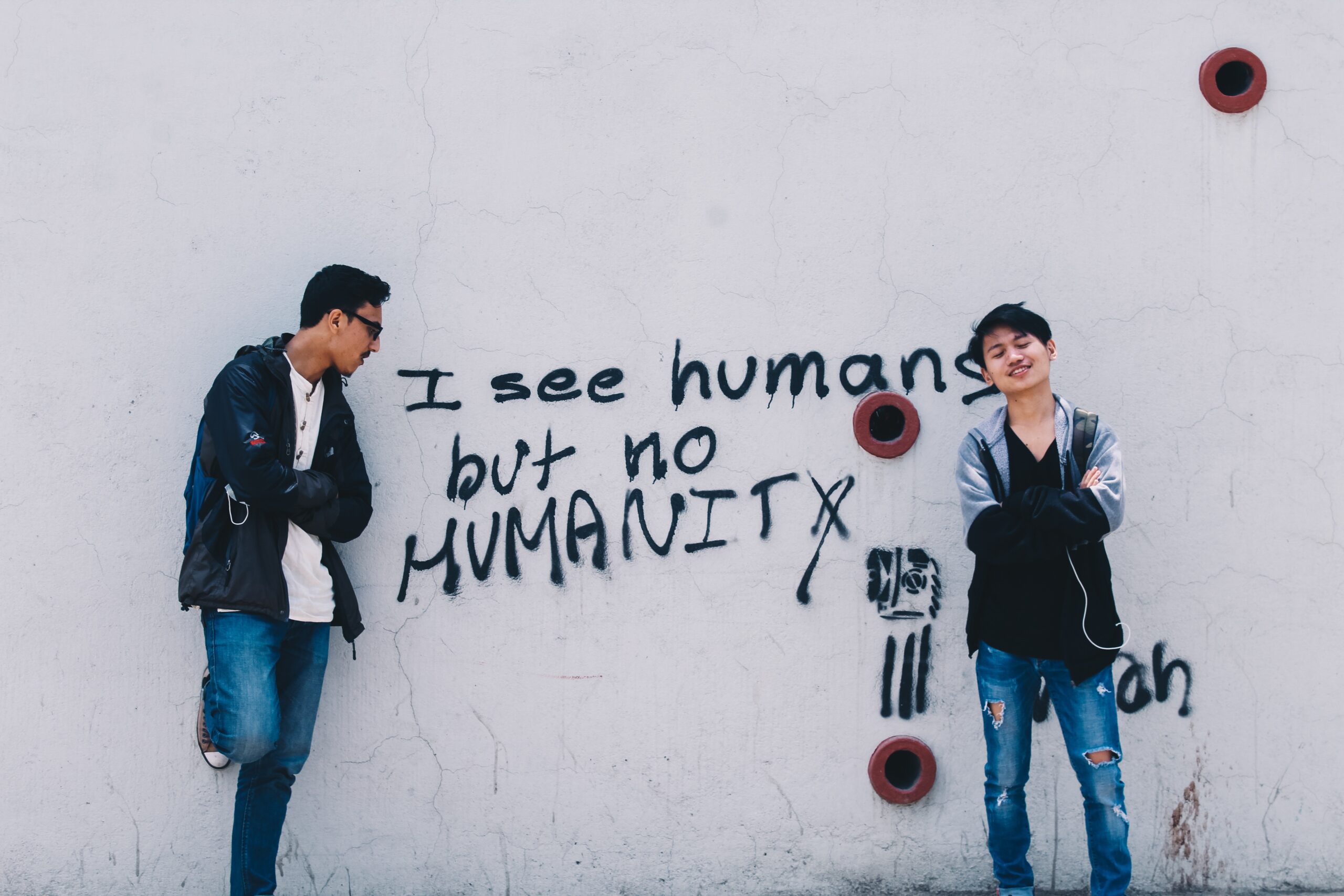These days, it sure is difficult being a human being. When I say that, I don’t mean that it’s harder to do the basics of being human, for example, talking, eating, sleeping, working, playing, the list goes on. I mean the deeper aspects of being human, the ways we think, experience emotions, behave, interact with others, and react to our ever-changing world.
The challenges of accepting and, in fact, celebrating in, our humanity is exacerbated by a media- and money-driven culture that no longer reflects human needs and wants, but rather dictates them. The messages of wealth, status, power, beauty, perfectionism, and self-interest all conspire to cause us to distance ourselves from our humanity for fear that we will be rejected by our popular culture and, more proximally, the people in our lives.
Sadly, in rejecting our humanity, however unintended it might be, we are also denying all that makes being human so meaningful, inspiring, gratifying, and joyful. To help you connect (or reconnect) with what it truly means to be human, here are seven ways to embrace your humanity.
Accept Your Imperfections
Our culture sees our flaws as not only as failures of our selves, but also aspects of us to be ashamed of. These so-called imperfections include insecurity, doubt, worry, stress, mistakes, failures, and unhealthy emotions. Yet, being flawed is an unavoidable and, dare I say, essential part of the human condition. It is our shortcomings that keep us humble, that encourage us to grow, and that motivate us to become the best version of ourselves.
It is not our imperfections that are the problem, but rather our unwillingness to accept them for fear that we will be less lovable, respected, valued, and accepted. Additionally, it is incredibly exhausting, distracting, and happiness-killing to resist our imperfections. The hyper-vigilance required to keep our flaws in check and the time and energy needed to defend against them prevents us from pursuing our dreams, building healthy relationships, and simply finding peace and contentment in our lives.
When you accept your humanity, you free yourself from having to live in a state of perpetual threat. In those moments when you experience the less-desirable aspects of your humanity, instead of beating yourself up about it (which only adds insult to the injury of not being perfect), you can simply accept that oh-so-human side of you, try to resolve it, learn from it so it’s less likely to happen again, let it go, and continue on with your life.
Be Open to Yourself and the World
When we refuse to accept the unavoidably human aspects of ourselves, we view ourselves and the world as threats that we must safeguard ourselves from. In doing so, we trigger our primal instinct because, though physical death in our modern 21st century life is unlikely, our primitive brain mistakenly perceives our present-day transgressions as dangers to our survival. Our natural reaction is to protect ourselves by closing ourselves off from those fears and from others.
In these attempts at self-protection, we inadvertently close ourselves off from, as Abraham Lincoln so beautifully stated, “the better angels of our nature.” We also close ourselves off from other people (more on that later).
When you embrace your humanity, you remove the threat that closes you off from yourself and world, thus enabling you to both express outwardly all that is good within you and to welcome the outside world into your inner world of compassion, caring, support, and love.
Let Your Values Guide Your Life
There may be nothing more important to embracing our humanity and living a purpose-driven life than knowing and being guided by our most deeply held values. Values are both our North Star and our road map to the kind of life we want to lead.
Another unfortunate aspect of our toxic popular culture has been its contaminating influence on our values. Sadly, as I mentioned above, our popular culture venerates values that are generally antithetical to human health, well-being, happiness, and deep connection.
In previous generations, most of the institutions that affected our lives supported healthy values. In the 21st century, particularly with the rise of the internet, we are largely left on our own to find and embrace positive values, with the support of family, friends, and communities.
Our current value-challenged culture also requires us to be thoughtful and deliberate about identifying and embracing the values we choose to live by. You are encouraged to sit down, examine the types of values that reflect what is important to you and what you prioritize in your life. Once you have identified those values, you can then actively seek to create a life that aligns with them.
Feel Deeply
One of the most difficult parts of embracing your humanity is to give yourself permission to experience your emotions in the deepest way possible. There are several challenges to feeling deeply. First, our culture views emotional vulnerability and expressiveness as signs of weakness (particularly among males). The messages we often get are to be cold, stoic, and “tough.” Yet, to fully experience your emotions, you must see them as strengths because it takes courage to be emotional.
Second, you can’t cherry pick your emotions, meaning you can’t just choose to feel the positive emotions (e.g., excitement, joy, happiness, love). Rather, emotions are two sides of the same coin; if you want to feel the pleasant emotions, you must also be willing to experience the unpleasant emotions (e.g., frustration, anger, sadness).
Third, what often prevents us from feeling our emotions deeply is that we think that when we feel badly, the emotions will be overwhelming and suffocating. Admittedly, some unpleasant emotions are very painful, for example, loneliness, hurt, and sadness. Yet, an essential life lesson that will hopefully encourage you to feel deeply is that, though many emotions can be difficult, they often don’t last long, and you will survive them. The reward for accepting that side of the emotional coin is the opportunity to feel love, excitement, passion, compassion, joy, and gratitude in their most profound and life-nurturing form.
Establish Healthy Relationships
One of the most robust findings in the research on happiness is that healthy relationships are an essential contributor. At the heart of healthy relationships is the ability to be emotionally vulnerable and express feelings of caring, support, and love. Yet, in the defended state when we reject our humanity that I described above, that is not possible. Others sense these messages of closedness and are reluctant to approach us for fear that their efforts will be rebuffed. In other words, when others feel our defensiveness, they get defensive too.
When you accept your humanity, you let your guard down and open yourself up to your inner strengths, talents, and dreams. You can unleash those internal capabilities and express them outwardly without doubt, worry, or fear, and with courage, commitment, and vigor.
You also open yourself up to the world around you. You are more relaxed and welcoming of others. Think of physically opening your arms when someone approaches you as a literal manifestation of being emotionally open. In turn, others sense this and are more willing to respond in kind.
Of course, embracing your humanity and making yourself emotionally vulnerable to someone else is risky. When you express feelings (e.g., familial, friendship, romantic) toward someone, you go out on the limb with the danger of the other person not reciprocating or, even worse, judging your humanity or attacking your vulnerabilities, and rejecting you.
At the same time, if you are committed to pursuing truly deep and meaningful relationships, that is a risk you must take. But that risk can be calculated instead of reckless. You can proceed cautiously, rather than in a “full speed ahead” manner where “crashes” are more likely to occur. You can incrementally get to know people and steadily build trust until you believe that you have found the right person who is equally accepting of their humanity and willing to be emotionally vulnerable.
Own Your Mistakes
Another part of being human is making mistakes. We say something insensitive. We act selfishly. We lose our temper. We hurt someone’s feelings. Hopefully, we feel bad, perhaps guilty and ashamed. Yet, it is threatening to our sense of ourselves to admit that we acted badly. There is the fear that others (and we ourselves) will think that if you behaved badly then we are bad people.
In these situations, your protective reaction is to make an excuse, blame the target of your hurtful behavior, or blame someone else. This response may protect your self-esteem and make you feel better, but it damages the relationship, and you feel worse because not only did you act poorly, but you were not willing to own your mistakes.
Paradoxically, when you own your mistakes, you actually feel much better despite your bad behavior. By taking responsibility for your mistakes, you acknowledge that what you did was wrong and, in doing so, are beginning the process of self-atonement and reparation with those you harmed.
There are two ways to own your mistakes. First, you must acknowledge your transgression and recognize that only you are responsible for your behavior. Second, you can apologize. Unfortunately, we live in a culture of avoiding responsibility and blaming others. So often, we also hear so-called apologies that aren’t really apologies. You can tell a false apology from a real apology by the punctuation at the end. An apology that’s not really an apology typically blames someone or something other than yourself and is usually followed by a comma (“I’m sorry, but here’s the reason why it wasn’t my fault.”) A real apology has no excuse or blame of others after it. As such, a real apology always ends with a definitive period (“I’m sorry, I was wrong.”).
Accept Life’s Ups and Downs
Another difficult and unavoidable aspect of the human condition is that we will experience ups and downs in our lives. We will find success, love, personal growth, and education and professional advancement. At the same time, we will inevitably experience failure, setbacks, rejection, and loss.
When you accept your humanity, you see these highs and lows as a natural part of the rhythm and flow of life. You learn to celebrate and savor the highs and grieve and let go of the lows. You also realize that, in most cases, those ebbs and flows of life will not last. Importantly, embracing your humanity allows you to respond to them with the equanimity that Rudyard Kipling so beautiful describes in his classic poem If: “If you can meet with Triumph and Disaster and treat those two impostors just the same.”




